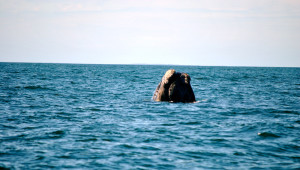The Calvineers!
How Calvin's story inspires science students
By Eric Wagner

He teaches fifth- through eighth-grade science in the small town of Castine, Maine. For many years, McWeeny has volunteered with right-whale scientists like Moira Brown and Scott Kraus. So in 2004, when some of his students became interested in animal rights, he introduced them to Brown, of the New England Aquarium in Boston. And she shared Calvin’s tale.
At once, the students wanted to lend their help to Calvin. But first, they needed to learn more about right whales. At the time, little information was available for the general public. So McWeeny gave his students scientific papers to read.
Scientific papers can be dense and complicated. Still, McWeeny was sure that with a little aid, his students could wade through them. They read about everything from right whale physiology (how the animals’ bodies work) to how right whales behave. They even read about how laws and shipping rules affect right whales.
Soon, the students were ready to share what they had learned. So McWeeny and his Calvineers, as the group called itself, traveled to local schools to share details on the plight of right whales. They gave a presentation at the 2005 annual meeting of the Right Whale Consortium. In 2007, they even met their senator, Susan Collins!
Then, in 2009, McWeeny thought it was time for his students to give an official scientific talk about right whales. “I didn’t want the students to just act like scientists,” he says. “I wanted them to be scientists.” He proposed the idea to organizers of the 18th Biennial Conference of Marine Mammalogy. Hundreds of scientists would attend the conference in Quebec City, Canada.
The organizers liked McWeeny’s idea so much that instead of giving the students a single, small audience, they made the students plenary speakers. That means their presentation would serve as a highlight of the conference. Throughout their presentation, the middle-school students were interrupted by applause from some 1,800 scientists. At the end, the kids received a standing ovation.
New generations of Calvineers continue to work on right whale research. One student built a family tree for some whales, based on genetic data. Her finding ended up being published in a scientific paper.
“It’s great how Calvin has helped the students see the world as scientists do,” McWeeny says. “They go to meetings, they read papers, they work with data —they’re actually doing science.”